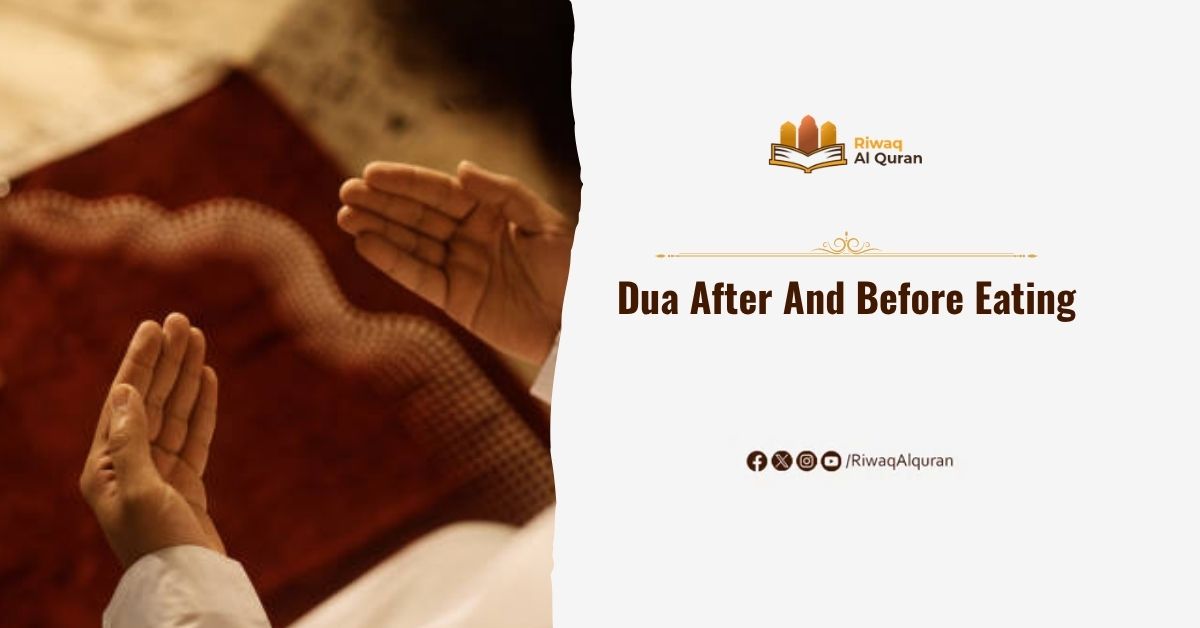Have you ever rushed through a meal, only to realize you forgot to say Bismillah? In today’s fast-paced world, even something as essential as eating can become automatic. But Islam teaches us that every bite is a blessing — and one we should acknowledge with dua.
Reciting the before-and-after-eating dua helps us not only fulfill a sunnah but also cultivate gratitude, presence, and spiritual awareness. By turning to Allah before and after meals, we transform ordinary moments into acts of worship.
Table of Contents
Powerful Duas for Eating Before and After
Here are several authentic and powerful eating duas before and after meals, as taught by the Prophet Muhammad ﷺ. Each dua plays a specific role—to begin in the name of Allah, to block Shaytan from partaking in your food, and to show gratitude after finishing your meal. Memorizing and practicing them regularly brings both spiritual and practical benefits.
1. Before Eating Dua (Basic Sunnah Dua)
Say this before eating to start your meal with the name of Allah.
Arabic:
بِسْمِ ٱللَّهِ
Transliteration:
Bismillāh
Translation:
In the name of Allah.
2. Dua for Forgetting the Before Eating Dua
If you forgot to say Bismillah at the beginning, say this when you remember during the meal.
Arabic:
بِسْمِ ٱللَّهِ أَوَّلَهُ وَآخِرَهُ
Transliteration:
Bismillāhi awwalahu wa ākhirah
Translation:
In the name of Allah, at its beginning and its end.
3. Finish Eating Dua (Gratitude After Eating)
Say this after eating to thank Allah for the food and recognize your dependence on Him.
Arabic:
ٱلْـحَمْدُ لِلَّهِ ٱلَّذِي أَطْعَمَنِي هَذَا، وَرَزَقَنِيهِ مِنْ غَيْرِ حَوْلٍ مِّنِّي وَلَا قُوَّةٍ
Transliteration:
Alḥamdu lillāhi alladhī aṭʿamanī hādhā, wa razaqanīhi min ghayri ḥawlin minnī wa lā quwwah
Translation:
All praise is for Allah, who fed me this and provided it for me without any power or might from myself.
4. Alternative Finish Eating Dua (Shorter Version)
This is a brief and commonly recited after-eating dua.
Arabic:
ٱلْـحَمْدُ لِلَّهِ
Transliteration:
Alḥamdu lillāh
Translation:
All praise is for Allah.
5. Comprehensive After-Eating Dua with Praise
For those seeking a more detailed praise and thanks to Allah after food.
Arabic:
ٱلْـحَمْدُ لِلَّهِ حَمْدًا كَثِيرًا طَيِّبًا مُّبَارَكًا فِيهِ، غَيْرَ مَكْفِيٍّ وَلَا مُوَدَّعٍ، وَلَا مُسْتَغْنًى عَنْهُ رَبَّنَا
Transliteration:
Alḥamdu lillāhi ḥamdan kathīran ṭayyiban mubārakan fīh, ghayra makfiyyin wa lā mūwaddaʿin, wa lā mustaghnan ʿanhu rabbānā
Translation:
All praise is due to Allah—abundant, pure, and blessed praise. It is never enough, never abandoned, and we are never independent of our Lord.
6. Dua When Invited to Eat at Someone’s Home
Say this dua after finishing a meal at someone else’s house, as taught by the Prophet ﷺ.
Arabic:
ٱللَّهُمَّ بَارِكْ لَهُمْ فِيمَا رَزَقْتَهُمْ، وَٱغْفِرْ لَهُمْ، وَٱرْحَمْهُمْ
Transliteration:
Allāhumma bārik lahum fīmā razaqtahum, waghfir lahum, warḥamhum
Translation:
O Allah, bless them in what You have provided for them, forgive them, and have mercy on them.
Hadith: Muslim
7. Dua After Drinking Milk
A special dua the Prophet ﷺ would say after drinking milk.
Arabic:
ٱللَّهُمَّ بَارِكْ لَنَا فِيهِ وَزِدْنَا مِنْهُ
Transliteration:
Allāhumma bārik lanā fīhi wa zidnā minhu
Translation:
O Allah, bless it for us and increase it for us.
8. Dua After Eating at a Gathering (with Many People)
Another version of gratitude after a communal meal or feast.
Arabic:
ٱلْـحَمْدُ لِلَّهِ ٱلَّذِي أَطْعَمَنَا وَسَقَانَا، وَجَعَلَنَا مُسْلِمِينَ
Transliteration:
Alḥamdu lillāhi alladhī aṭʿamanā wa saqānā, wa jaʿalanā muslimīn
Translation:
All praise is due to Allah, who fed us, gave us drink, and made us Muslims.
9. Dua for Eating with Others (When Starting Together)
A reminder to start the meal with Allah’s name as a group.
Arabic:
بِسْمِ ٱللَّهِ وَعَلَى بَرَكَةِ ٱللَّهِ
Transliteration:
Bismillāhi wa ʿalā barakatillāh
Translation:
In the name of Allah and upon the blessings of Allah.
A common phrase used when sharing food
10. Dua for Eating Dates in Odd Numbers (Following Sunnah)
Though not a supplication per se, following the Sunnah of eating dates in odd numbers is itself a spiritual act.
The Prophet ﷺ used to love eating dates in odd numbers (e.g., 1, 3, 5…). Before eating dates or any fruit, you can simply say:
Arabic:
بِسْمِ ٱللَّهِ
Transliteration:
Bismillāh
Translation:
In the name of Allah.
This maintains the consistency of remembering Allah before every bite.


The Power and Significance of Dua for Eating
Eating is a daily act we often take for granted — yet in Islam, even this simple habit holds the potential for ibadah (worship). By saying the before and after eating dua, we transform an ordinary meal into a moment of remembrance, gratitude, and spiritual growth.
Read Also: Duas for Protection from Evil Eye and Jealousy
An Islamic Perspective on Eating
The Prophet Muhammad ﷺ taught us that food is a blessing from Allah, and He deserves to be remembered at every meal. When we say Bismillah before eating, we are seeking Allah’s name to bless the food and protect us from Shaytan. When we say Alhamdulillah after eating, we are recognizing that we own nothing—not even a single bite—without His will.
In doing so, we shift our mindset from entitlement to thankfulness, which is beloved to Allah.
“Indeed, Allah is pleased with the servant who praises Him when he eats and praises Him when he drinks.”
— Sahih Muslim
The Virtue of These Supplications
Saying the eating dua before and after carries great rewards.
- Protection from Shaytan:
“When any one of you eats and says ‘Bismillah,’ Shaytan is prevented from partaking in the food. If he forgets and remembers later, Shaytan is vomited out.”
— Abu Dawood - Forgiveness of sins:
“Whoever eats food and says, ‘Alhamdulillah alladhi atʿamani hādhā…’ will have his past sins forgiven.”
— Tirmidhi - Expression of humility:
The dua after eating acknowledges that we had no power or strength to earn this food without Allah. It reinforces Tawakkul (reliance on Allah) and strengthens our faith. - Following the Sunnah:
Reciting these duas revives the beautiful daily Sunnah of the Prophet ﷺ—something we are highly encouraged to do in all aspects of life.
In essence, duas for eating are not just rituals—they’re reminders that everything we consume is a trust from Allah, and every meal is a chance to reconnect with Him.
Practical Steps to Complement Your Duas
While making before-and-after-eating duas brings immense spiritual reward, Islam teaches us to pair dua with practical effort (sabab). Here are simple yet effective ways to live out the meaning of your eating duas and enhance your mindfulness, gratitude, and healthy habits around food:
1. Be Present and Eat Mindfully
Slow down. Avoid distractions like phones or TV while eating. When you say Bismillah, take a moment to reflect on Allah’s blessings and enjoy your food with awareness. This transforms your meal into an act of worship.
2. Eat with the Right Hand and From Your Side
Follow the Sunnah by eating with your right hand and from the part of the plate nearest to you. These small actions demonstrate obedience and respect for Prophetic etiquette.
3. Avoid Wastefulness
Don’t overfill your plate. Serve moderate portions and avoid throwing away food. The Prophet ﷺ disliked wasting even a single morsel. This mindset aligns with your dua of gratitude by treating food as a divine gift.
4. Share Meals with Others
Eating with family or friends multiplies blessings. The Prophet ﷺ said:
“Eat together and do not eat separately, for the blessing is in being together.”
— Ibn Majah
Even simple meals become more fulfilling and spiritually rewarding when shared.
5. Teach Your Children the Eating Duas
Make it a habit to recite the eating dua before and after out loud at family meals. Use repetition and reward to help your children memorize them. This builds lifelong habits of gratitude and worship.
6. Clean Up and Say Alhamdulillah Again
Finish your meal by cleaning up after yourself and repeating Alhamdulillah. It shows responsibility and reinforces a heart full of thanks.
By combining duas for eating with conscious action, you live Islam not just in prayer but in every bite—turning a daily habit into a consistent act of ibadah and spiritual reflection.
Read Also: Top 10 Quranic Duas for Pregnancy
Learn Quran and Islamic Studies with Riwaq Al Quran
Making dua is a beautiful way to stay connected with Allah—but it’s just the beginning. The next step is to seek knowledge that deepens your faith and understanding of Islam.
At Riwaq Al Quran, we help you do exactly that. Whether you’re a beginner or looking to strengthen your connection with the Quran and Sunnah, our qualified and experienced teachers are here to guide you every step of the way.
- One-on-one online classes tailored to your level
- Courses for kids and adults in Quran recitation, memorization, and Islamic studies
- Native Arabic-speaking tutors who make learning engaging and effective
- Flexible schedules to fit your lifestyle
Join thousands of students around the world who are learning to recite, understand, and live by the Quran.
Make every dua count. Begin your journey of sacred knowledge today.
When is the Best Time to Make These Duas?
The best time to make the eating dua before is right before you take your first bite or sip. As soon as you sit down to eat, say “Bismillah” to begin your meal with the name of Allah.
If you forget and remember later during the meal, say, “Bismillahi awwalahu wa akhirahu” to make up for the missed beginning.
The after-eating dua should be recited immediately after finishing the meal, before getting up or clearing your plate. It’s a moment to reflect and thank Allah for the nourishment He just provided.
Can I Say These Duas in English, or Do They Have to Be in Arabic?
The preferred and most rewarding way to say these duas is in Arabic, as that’s how the Prophet ﷺ taught them. However, if you don’t know Arabic yet, you can say them in English (or your native language) with sincerity—especially if you’re still learning.
What matters most is your intention, presence of heart, and gratitude to Allah. As you grow in knowledge, try to gradually learn and memorize the Arabic versions for full reward and connection to the Sunnah.
How Can I Help My Child Learn These Duas?
Helping your child learn the before-and-after-eating duas can be a beautiful bonding experience and a lifelong gift. Here are a few simple and effective ways to teach them:
1. Lead by Example
Say the duas out loud at every meal. Children learn best by observing—when they hear you consistently say Bismillah and Alhamdulillah, they’ll naturally follow.
2. Make It Fun and Repetitive
Turn the duas into a short song or chant. Repeat them daily with enthusiasm. Repetition playfully builds familiarity and memory.
3. Use Visual Aids
Create or print colorful dua charts and stick them in the dining area. You can also use storybooks or Islamic kids’ apps that include these duas with animations and sound.
4. Reward and Encourage
Praise your child or offer small rewards when they remember the dua on their own. Positive reinforcement builds confidence and motivation.
5. Explain the Meaning
Teach them the meaning behind the dua, even in simple words. For example, say, “We say Bismillah to ask Allah to bless our food and keep Shaytan away.” This helps them connect emotionally and spiritually.
With consistency and love, your child will not only memorize the duas but also understand and cherish the habit of beginning and ending meals with remembrance of Allah.
Explore Our Quran Kids Courses Now—and choose from a wide variety of programs tailored for every level:
- Quran Recitation Course for Kids
- Quran Memorization (Hifz) Course
- Tajweed for Kids
- Islamic Studies for Kids
- Dua and Hadith Memorization Course
- Arabic Language for Kids
Let your child start their learning journey with qualified teachers, structured lessons, and a love for Islam that lasts a lifetime.
Explore Our Quran Kids Courses Now
What If I Make a Mistake in Pronunciation?
Don’t worry—Allah is Most Merciful and knows your intention. If you’re still learning and make a mistake in pronouncing the eating duas, you are still rewarded for trying.
What matters most is:
- Your sincerity
- Your effort to learn and improve
- Your intention to remember Allah
The Prophet ﷺ said:
“The one who recites the Qur’an and stumbles in it, finding it difficult, will have a double reward.”
— Sahih Muslim
This applies to all acts of worship. So keep practicing! Over time, your pronunciation will improve, and your confidence will grow. You can also use audio recordings or study with a qualified teacher to help perfect your recitation.


Learn Quran, Arabic And Islamic Studies Online With The Best Native Tutors
Riwaq Al Quran is a comprehensive online platform that offers personalized Quran, Arabic and Islamic Studies Online classes for individuals of all ages and backgrounds.
Their experienced instructors use a structured curriculum to cover Tajweed, Tafsir, and Memorization, providing easy and effective access to learning the Quran.
The advanced online classes allow for seamless communication and interaction between students and teachers. Join Riwaq Al Quran for a deeper connection with the Quran.
We offer several courses such as:
- Online courses for kids.
- Online Quran classes for kids and adults.
- Online Arabic courses
- Online Ijazah courses
- Online Islamic Studies courses.
Here are a sample of our set of Quran Courses that will be helpful for you:
- Online Tafseer Course: Delve into Quranic meanings with our insightful online Tafseer course.
- Noorani Qaida Online: Learn Quranic basics efficiently through our Noorani Qaida online program.
- Online Quran Recitation Course: Enhance Quranic recitation skills through our expert-led online course.
- Online Tajweed Classes: Master Tajweed rules for beautiful Quranic recitation in online classes.
- Quran Memorization Online Course: Memorize the Quran effectively with our specialized online memorization course.
- Online Qirat Course: Explore diverse Qirat styles with our comprehensive online Qirat course.
Online Quran Classes for Kids: Nurture a love for the Quran in kids through interactive online classes.
Conclusion
Eating is more than just a daily routine—it’s an opportunity to connect with Allah through gratitude and remembrance. By reciting the before- and after-eating duas, you turn every meal into an act of worship and thankfulness.
These simple yet powerful supplications protect you from Shaytan, remind you of Allah’s countless blessings, and strengthen your faith with every bite. Whether you’re just starting to learn or teaching your children, remember: what matters most is sincerity and consistency.
So the next time you sit down for a meal, begin with “Bismillah,” end with “Alhamdulillah,” and let your food nourish not just your body but your soul as well.
Place your trust in Allah—even in the little things—and He will bless you in ways you never imagined.


































